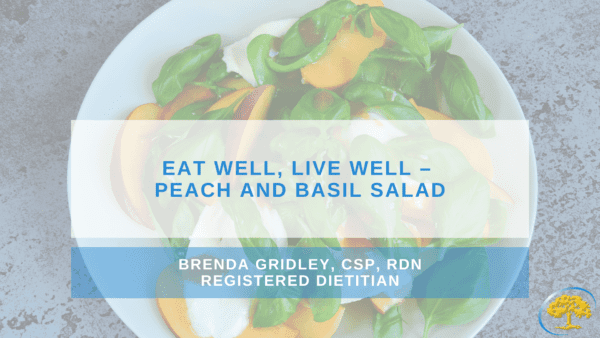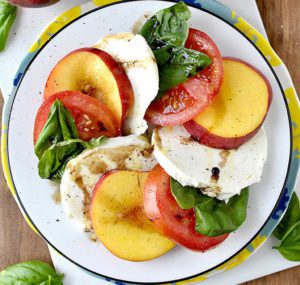
Posted 9 months ago
Eat Well, Live Well – Peach and Basil Salad
It’s Officially Peach Season!
Peaches are a fuzzy fruit native to northwest China. They are a member of the stone fruit family, which means that their flesh surrounds one large middle seed. The inner flesh of a peach ranges in color from white to yellow or orange. There are two different varieties of peach: freestone and clingstone. These names indicate whether the flesh sticks to the inner seed or easily comes apart from it.
The benefits of consuming fruits and vegetables are considerable. As plant food consumption increases, the risk of many lifestyle-related diseases including obesity, diabetes, heart disease and cancers reduces.
 Some benefits to including peaches in your diet include the vitamin C and fiber content of these sweet, juicy fruits. A cup of diced peach provides 11.1 milligrams (mg) of vitamin C, as well as contributing to the recommended daily allowance (RDA) of potassium, fiber, and iron. This amount of vitamin C equates to 12-15% of the RDA for adults. Vitamin C is a powerful antioxidant that can help prevent the formation of free radicals, which are compounds that have links to cancer development.
Some benefits to including peaches in your diet include the vitamin C and fiber content of these sweet, juicy fruits. A cup of diced peach provides 11.1 milligrams (mg) of vitamin C, as well as contributing to the recommended daily allowance (RDA) of potassium, fiber, and iron. This amount of vitamin C equates to 12-15% of the RDA for adults. Vitamin C is a powerful antioxidant that can help prevent the formation of free radicals, which are compounds that have links to cancer development.
Despite their relatively low nutrient profile, peaches can still benefit people’s health as part of a balanced diet that includes many fruits and vegetables. Peaches can add sweetness to desserts and treats, replacing more harmful added sugar. That same cup of diced peaches contains 2.52 g of fiber.
Fiber-rich foods provide a range of important health benefits- They can protect the health of the colon, support weight management on a long-term basis, and reduce the risk of several harmful health conditions including cardiovascular disease, type 2 diabetes, and several cancers. A person could significantly boost their fiber intake by replacing sweet, low fiber treats with a peach or two every day.
Here in Arizona peaches peak in July and August so now is a great time to explore this juicy, sweet fruit. A delicious way to add peaches to your diet is a delicious salad that marries summer’s juicy, sweet peaches and aromatic basil with velvety fresh mozzarella. This quick to fix, simple salad has a lot of vitamin C, beta-carotene, calcium and fiber. Serve as a light main dish or side salad.
Peach and Basil Salad
Ingredients
– 1 lb. peaches, sliced into wedges, then cut crosswise (frozen may be used)
– 8 oz. part skimmed, fresh mozzarella cheese, cut into 3/4-inch cubes
– 1 cup loosely packed fresh basil, torn into medium pieces
– 2 tsp. extra virgin olive oil
– 2 tsp. rice vinegar
– Pinch salt
– Freshly ground black pepper, optional
Directions
1. In large mixing bowl combine peaches, mozzarella and basil.
2. Drizzle on oil and vinegar, add salt and pepper, if using, and toss gently until evenly coated.
3. Serve immediately or refrigerate up to 4 hours.
Brenda Gridley, CSP, RDN
Brenda is originally from Los Angeles, CA where she attended California State University of Los Angeles for her under graduate degree in Nutritional Science. She began her career with Kaiser Permanente in 2004. Throughout her professional development, she has worked in Cardiology and open heart surgery, Renal/Dialysis, organ transplants and Oncology, including chemotherapy, radiation and head and neck. Brenda has extensive experience with weight management programs, including Bariatric and finally Eating disorders and mindful eating. She went on to specialize in the Pediatric population and has maintained her Certification in Pediatric Nutrition since 2011. Areas she has managed include pediatric and neonatal intensive care units where she was responsible for individualizing therapeutic diets and alternate nutrition support based on specific metabolic needs, medical conditions, and cultural preferences.
Her passion for nutrition was developed at a young age and reared by her grandmother who always instilled the importance of a healthy diet and active lifestyle. When her grandmother became ill, Brenda became aware of the impact nutrition plays in disease prevention and maintaining overall mind and body health. She cared for grandmother until she passed and has made it her goal to help others achieve their full “nutrition potential” with using a culturally sensitive holistic approach.
She is married with two beautiful daughters and in her spare time she enjoys watching movies with her children, experimenting with new recipes, reading mystery novels, running and Yoga.
Please ask your Ironwood Cancer & Research Centers provider for a referral to see our dietary counselors.

